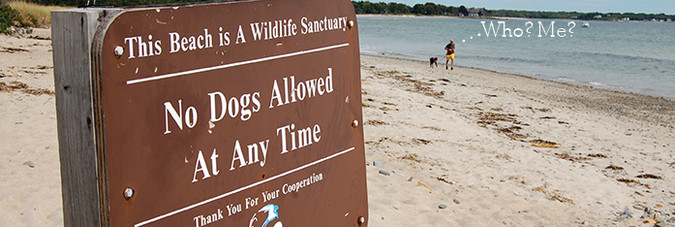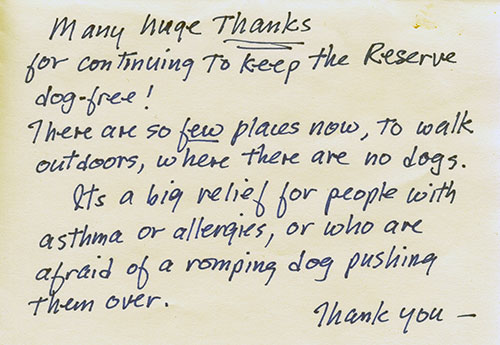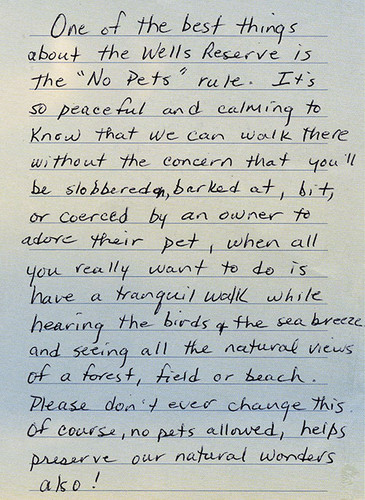The Wrack
The Wrack is the Wells Reserve blog, our collective logbook on the web.
The Wrack is the Wells Reserve blog, our collective logbook on the web.

The reserve has a no-pets policy. It may be our least popular restriction. From Rules for Public Use of Wells Reserve [updated 2019]:
(G)(3) Pets: With the exception of service animals, domestic pets are prohibited from the Wells Reserve.
By and large, visitors respect this rule. Occasionally, we see a wandering cat, a "lost" bunny, or a loose or leashed dog on the property, but after a couple of decades living with the ban almost everybody leaves their pet at home when they come to enjoy nature at the reserve.
The commonest breach — and potentially the most consequential — is the owner who frees a dog on Laudholm Beach. It happened just this morning and didn't go unnoticed.
A biologist surveying piping plovers and least terns at Crescent Surf Beach, just across the Little River from Laudholm Beach, spotted two dogs on the run and tried without success to get their owner's attention from across the river. The roaming dogs were in the vicinity of an active plover nest and, intentionally or not, could have destroyed the eggs.
The young plover killed by a loose dog on Scarborough Beach in 2013 was a reminder of how quickly such an unfortunate event can occur.
Wildlife protection, particularly for endangered species, should be enough reason to follow the rules here at the reserve, but the "Please — No Pets" policy has supporters among the many who value the absence of domestic animals when they're walking the trails. Here are a couple of recent examples of the kind of praise our rule inspires:


At its core, rule (G)(3) simply reflects a management philosophy going back to the creation of the Wells Reserve and, a few years later, its Management Authority. With emphasis added, here is an excerpt from Appendix D of the 2013–2018 management plan, "Rules for Public Use of Wells Reserve: Summary":
The Wells National Estuarine Research Reserve was established under 15 Code of Federal Regulations, Part 921. It is maintained to provide a natural field laboratory, which includes the protection of natural resources for short and long-term research, monitoring, and education. The Wells National Estuarine Research Reserve is also maintained to protect fish, wildlife, and plant communities. Multiple uses including low intensity recreational uses are allowed to the extent that they do not conflict with the operation of the Reserve for research, education, and natural resource protection.
The Wells National Estuarine Research Reserve Management Authority (the Authority) was established by the State legislature through passage of Private and Special Law #108 in 1990. The legislation was amended by Private and Special Law #777 in 2003. The purpose of the Authority is to manage and sustain the coastal lands and other resources within the reserve; further coordination and cooperation among state agencies, the Town of Wells and the United States Fish and Wildlife Service, and the Laudholm Trust; develop and implement programs for estuarine research and education and provide public access and opportunities for public enjoyment compatible with the protection of the reserve’s natural resources. The Authority, in compliance with the Reserve’s Management Plan, is responsible for management of the Reserve lands for which the Authority holds a license, lease or other interest or lands that are under agreement with a cooperating agency. The Authority has overall jurisdiction over the establishment and coordination of research, education, and resource management policies for the Reserve. A violation of the rules of the Reserve is a Class E crime. Reserve regulations are superseded by US Fish and Wildlife Service regulations on the property of the US Fish and Wildlife Service’s Rachel Carson National Wildlife Refuge.